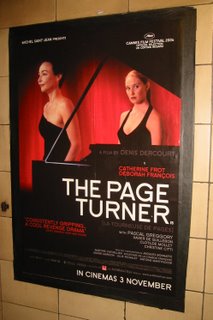 As the film begins, Déborah François plays a young girl Mélanie preparing for a piano audition. Reassuringly, her father, a butcher, insists that they’ll keep paying for lessons even if she doesn’t pass. “I wouldn’t want you to” she replies.
As the film begins, Déborah François plays a young girl Mélanie preparing for a piano audition. Reassuringly, her father, a butcher, insists that they’ll keep paying for lessons even if she doesn’t pass. “I wouldn’t want you to” she replies.Alone in the exam room in front of the assessors, the piece is going well. Until a fan slips into the room to get an autograph from the famous concert pianist Ariane (played by Catherine Frot) who is one of the examiners. The fuss distracts Mélanie, she stops playing, and when she restarts, her performance disintegrates.
Returning home, Mélanie locks the piano and removes the bust of Mozart. Her bright musical future ruined by Ariane’s rudeness and lack of control.
All this brought back memories of childhood and taking music exams in Belfast School of Music in Belfast’s Donegal Pass. Waiting nervously in corridors and rooms with wall mounted electric bar heaters, before making the long walk to enter the wooden-floored performance rooms to trot out the three prepared pieces and tackle the ghastly sight-reading.Last time I saw François, she was playing the role of Sonia, a young mother in the chaotic and twisted L’enfant (The Child). La Tourneuse de Pages (The Page Turner) is an altogether calmer film: the menace is understated, and more powerful as a consequence. The film is subtitled into English. But from early on, it is clear that speech is minimised. Jérôme Lemonnier’s piano score
The story jumps forward. Mélanie is now a young woman, starting work as an intern in a law firm. The Mozart bust sits on the desk in her flat. She volunteers to be nanny for the boss’s son Tristan while he will be away from home on business and her internship will be over. And so she finds herself living in the family mansion. The boss’s wife? Ariane the concert pianist. She is now traumatised after a car accident, very nervous, and only plays as part of a violin/cello/piano trio. And she doesn’t recognise Mélanie.
 Revenge is served slowly throughout the rest of the film. Mélanie fills in as Ariane’s page turner during practices, and her quiet support and musical knowledge ensure that she becomes an invaluable prop for Ariane in the run up to an important radio concert.
Revenge is served slowly throughout the rest of the film. Mélanie fills in as Ariane’s page turner during practices, and her quiet support and musical knowledge ensure that she becomes an invaluable prop for Ariane in the run up to an important radio concert.Another aside! Long time ago, I did GCSE Music. Part of the final marks came from performance. So as I played by sounds-like-Dvorak-but-wasn’t violin piece, the head of the school music department accompanied on piano. Not blessed with a page turner, half way through the piece he turned over two pages at once. Like a true pro, I kept playing what I was meant to regardless, and eventually he got himself sorted out and fell back into place. It didn’t do my marks any harm - in fact, I’ve always suspected that it boosted my marks beyond my ability! Back to the film ...But Ariane’s faults haven’t gone away. She’s slow to thank Mélanie after the successful concert—signing an autograph first—and even interrupts dinner to get her son to answer the phone.
(Spolier alert!) A talented player himself, Mélanie encourages Tristan to practice playing a difficult piece at speed, so he can show off on his father’s return … all the while aware that this could cause physical pain and damage to his hands and arms. Mélanie acknowledges the wandering eye of the trio’s cellist, and drops his cello (complete with long protruding metal spike) onto his foot as he tries to fondle her. Ouch. Showing a glimpse of the violence that might lie beneath the beautiful, attentive exterior. And as Ariane becomes more and more emotionally attached to Mélanie, there are the beginnings of a physical attraction. The night before Mélanie is due to leave the family, Ariane gives her a card declaring her love.
 Mélanie leaves early before the family waken. And the dominoes that she has so carefully set up all fall down with a clinical precision. Ariane’s life has been completely deconstructed. Her career is in pieces, her marriage, family and wealth is in jeopardy. Her future is ruined. It’s all too much for her. Her final fall is an unexpected and unbloody twist.
Mélanie leaves early before the family waken. And the dominoes that she has so carefully set up all fall down with a clinical precision. Ariane’s life has been completely deconstructed. Her career is in pieces, her marriage, family and wealth is in jeopardy. Her future is ruined. It’s all too much for her. Her final fall is an unexpected and unbloody twist.It was only when I read the Channel 4 Film review that I saw the parallel with the other French piano film I saw this year: The Beat That My Heart Skipped. But there is a difference. As Sam Jordison comments:
“There is one vital difference between the two films, though: whereas music was the source of redemption in The Beat That My Heart Skipped, here it's the toxic fuel for revenge. To reveal how this is carried out is to give too much away.”It’s a great film. Find it in a cinema or later on DVD. Not too long. Not rushed. Very French. But with just enough momentum to build up to a satisfying conclusion, and lingering doubt over who the real victim is.
October 2007 update: I watched it again on DVD ...
No comments:
Post a Comment